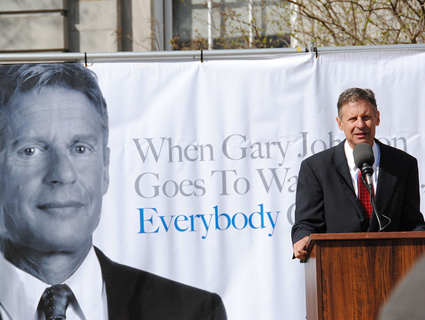
For GOP candidates to earn a spot in tonight’s Bloomberg/Washington Post-sponsored presidential debate, they needed to clear a couple of hurdles. According to the published criteria, they had to win measurable support in some polls, raise more than $500,000 by the second quarter of 2011, and have participated in at least three nationally televised presidential debates. Most of the eight candidates on stage tonight make the cut, but one definitely doesn’t: Texas Gov. Rick Perry.
GOP candidate Fred Karger, who won’t be in the debate tonight and who’s been shut out of all the others as well, in part because he’s gay, sent a letter to New York Mayor Michael Bloomberg this weekend complaining about Perry’s special treatment. Karger argues that Perry doesn’t qualify for the debate because, among other things, he wasn’t even a declared candidate before the end of the second quarter of 2011 and he has yet to file a single campaign disclosure form with the Federal Election Commission. Karger says that if Bloomberg is going to let Perry into the debate even though he doesn’t qualify, then the debate sponsors have an obligation to let in all the other candidates who don’t quite make the cut either, including Karger, former New Mexico Gov. Gary Johnson, and former Louisiana Gov. Buddy Roemer. Karger writes:
Mayor Bloomberg, since the debate organizers are not sticking to their own rules, then how about letting all serious Republican candidates for President on the stage to debate and talk about our ideas to fix the economy?
Let in former Governor’s Gary Johnson, Buddy Roemer and me. We all have much to add to this all important discussion.
Otherwise, under the organizers “pre-established objective criteria,” Mr. Perry should not be allowed to debate Tuesday at Dartmouth.
It’s a classic catch by Karger, who spent more than two decades specializing in the dark art of opposition research with such luminaries as the late GOP bad boy consultant Lee Atwater. Karger has used such skills to dog Mitt Romney, whom he accused of potential voter fraud earlier this year after discovering that Romney had voted in Massachusetts while apparently living in California. (Romney claimed to be residing one of his kids’ basements in Massachusetts.)
But as for the debate, Karger may have a point. Bloomberg and the Washington Post are giving Perry special consideration they refuse to give to the other candidates. Why not let the other guys in? Karger and Johnson are no more hopeless than Newt Gingrich, Rick Santorum or Jon Huntsman, but they at least offer a different perspective that might make the debate far less scripted than it’s likely to be. Imagine watching Karger respond to Santorum’s gay bashing or Johnson bringing up the merits of pot legalization with straight-laced Mitt Romney. Now that’s a debate that might be fun to watch. If nothing else, Bloomberg should think of the ratings!















